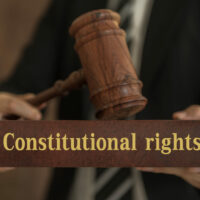Seven Constitutional Rights in Criminal Cases

The jury trial is the foundation of all Constitutional rights in criminal cases. In fact, 90 percent of the world’s jury trials occur in the United States. So, most other countries do not have this strong bedrock.
But the Constitution includes more than the right to a jury trial. There are important pretrial rights as well. Without them, a fair jury trial would probably be impossible, at least in most cases. These rights are especially important in circumstantial evidence criminal cases.
Due Process of Law
Notice and hearing are the two pillars of due process. Both of them are important in all phases of a criminal case. For example, before the state can take away a drivers’ license due to a DUI arrest, there must be an administrative hearing. A hearing officer must determine that officers had probable cause to request a chemical sample, the defendant refused to provide the sample, and officers followed all applicable procedures.
Reasonable Bail
Pretrial release is an important element of a solid criminal defense. If the defendant remains behind bars, the defendant may accept an unfavorable plea agreement just to get the case over with. At arraignments or bail reduction hearings, judges must consider a wide range of factors, and not just offense severity or criminal record, when setting bail.
Double Jeopardy Rule
Florida, or the federal government, cannot repeatedly try a defendant for basically the same charges. Drug cases are a good illustration. If the defendant is found not guilty of trafficking, authorities cannot charge the defendant with drug possession. The separate sovereignties exception also comes up quite often in drug cases. If there are similar federal and state crimes, the defendant might face charges in both forcums, regardless of the outcomes.
Right to Remain Silent
One of the most important Constitutional criminal rights is also much broader than some people believe it is. The Fifth Amendment does not just apply during trial testimony. Additionally, people have a right not to answer police officer questions. People also have the right not to perform tests, such as DUI field sobriety tests. There are some limitations. For example, if DUI defendants refuse to provide chemical samples, that refusal could be admissible in court, and they may be charged with a separate criminal offense.
Reasonable Suspicion
In most cases, police officers cannot randomly stop motorists on the road. Instead, officers must be aware of specific, articulable facts which indicate criminal activity. Roadside DUI checkpoints are the primary exception. If the roadblock meets all legal requirements, the reasonable suspicion rule does not apply.
Probable Cause
This requirement is embedded in several different requirements. Police officers cannot enter property and seize evidence unless they have probable cause. Additionally, in felony matters, a grand jury or another similar body must determine if probable cause exists before proceedings can move forward.
Public Trial
The important right is often overlooked. Public trials keep judges and prosecutors accountable and help keep the process fair for everyone. Judges may only close trials in very limited circumstances.
Connect with an Experienced Lawyer
Defendants have important rights in criminal cases, both before and during trial. For a free consultation with an experienced Port St. Lucie criminal lawyer, contact Eighmie Law Firm, P.A. We routinely handle matters throughout the Treasure Coast area.
https://www.eighmielawfirm.com/five-constitutional-rights-in-drug-cases/


